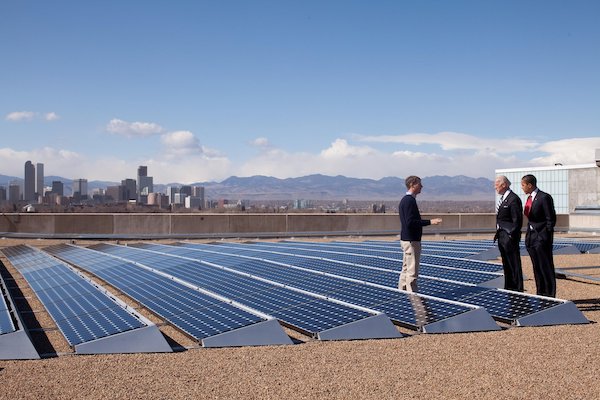This website uses cookies so that we can provide you with the best user experience possible. Cookie information is stored in your browser and performs functions such as recognising you when you return to our website and helping our team to understand which sections of the website you find most interesting and useful.
November 16, 2020
Biden-Harris Will Reshape ESG (Even Without the Senate)
The 2020 elections may have diverted attention away from the pandemic and climate emergencies for several weeks, but both are building fast. Fortunately, the incoming Biden-Harris administration has ambitious plans for each crisis. President-elect Biden campaigned on a sweeping $2 trillion plan to fight human-caused climate breakdown and grow the U.S. economy. That is 20 times the sum of related spending in the Obama-Biden Administration. His strategy would put the country on a path to achieving Net Zero Emissions economy-wide no later than 2050 and 100% carbon-free electricity by 2035.
The outcomes of the two Georgia Senatorial run-offs in January will decide which party controls the Senate. While a Republican-controlled senate would certainly curtail his ability to pass legislation and install his favored cabinet appointments, there are many actions the Biden-Harris Administration can take that do not require Congressional action. The collective impact of the scores of actions the Biden-Harris Administration is expected to take will reshape America’s response to human-caused climate breakdown and is likely to reshape the world of environmental, social, and governance (ESG) as a whole. This is true even if a GOP hostile to climate science, and even the word “sustainability,” retains control of the Senate.
Instead of the sweeping climate legislation that Biden ran on, under a Republic Senate, he would have to rely on a patchwork of smaller rules and regulations to enact his vision. He would also have to achieve portions of his plan through other pieces of legislation, like a coronavirus economic stimulus package. These relief efforts could include funds for renewable energy R&D, the extension of the solar and wind tax credits, and a focus on environmental justice.
Specifically, the Biden-Harris administration is expected to act on at least five different fronts through dozens of initiatives that will drastically impact the development of ESG and Corporate Sustainability over the next four years. For a much deeper dive, SR Inc recommends The Climate21 Project (a group of 150 experts and high-ranking former government officials that has put together a set of memos for 11 White House offices, federal departments, and federal agencies) and Clean Energy for Biden (a network of clean economy business leaders and advocates organized to help Biden advance policies, technologies, and investment to address the climate challenge that recently released 442 pages of recommendations).
- Global Leadership: On the first day of office, Biden plans to rejoin the Paris Climate Agreement, which will recommit the U.S. to limit the worst effects of climate change with every other country in the world in line with the United Nations Intergovernmental Panel on Climate Change’s 1.5°C Report (UN IPCC 1.5°C). The administration will also play a crucial leadership role on the global stage ahead of the UN’s 26th Climate Change Conference of the Parties (COP26) in Glasgow in November 2021. Recent Net Zero commitments by the European Union, China, and Japan set a high bar and make it likely that accelerating to “Net Zero Emissions” will become a defining goal of ESG-conscious leaders as the U.S. seeks to revive its global leadership on climate in Glasgow one year from today.
- White House Leadership: The Biden-Harris Administration is expected to use a whole of government approach that includes deploying executives charged with coordinated climate leadership in every major agency. These executives would answer to a new White House-based Council modelled on the National Security Council and potentially headed by John Kerry or Jay Inslee. The Council would spearhead a coordinated approach to fighting climate change using science-based policies. The Council is also likely to coordinate with leading corporate efforts to support the drive to Net Zero Emissions in a manner akin to corporate efforts to support the 2009 Cap & Trade Bill and corporate efforts to support the more successful run up to the Paris Climate Agreement in 2015.
- Federal Leadership – Appoint, Support, and Revive: The Biden-Harris Administration is expected to actively, publicly, and effectively support agencies including the Federal Reserve, the Securities and Exchange Commission (SEC), the Federal Energy Regulatory Commission (FERC), the Department of Energy (DOE), and the Environmental Protection Agency (EPA) to begin or revive dozens of federal ESG initiatives including the following:
- Due to the failure of Congressional support for a carbon tax or cap and trade scheme, Biden’s agenda focuses on subsidizing clean energy and pollution mandates, which are politically more feasible. Because of the 2007 Supreme Court ruling on Massachusetts vs. the EPA that found carbon emissions can be regulated by the EPA under the Clean Air Act, Biden will have the authority to set aggressive standards on his own, likely to be far more aggressive than Obama’s Clean Power Plan.
- He is also expected to ask the Department of Transportation to build upon Obama’s fuel economy standards that the Trump Administration rolled back and promote electric vehicles and their associated infrastructure.
- Voluntary corporate programs like the EPA’s Green Power Partnership and Energy Star programs are likely to get renewed attention and resources as these agencies try to work with and push the private sector to take more ambitious actions on renewables and energy efficiency.
- We also expect major R&D efforts from the DOE’s Office of Energy Efficiency & Renewable Energy to accelerate the development and adoption of renewable energy technologies.
- The SEC, which is an independent commission influenced by presidential appointees, may well require public companies to disclose GHG emissions and climate-related financial risks. These disclosures might be aligned with the Taskforce on Climate-related Financial Disclosures like the European Union and United Kingdom are proposing.
- The Department of Commerce, Treasury, and Federal Reserve are also expected to promote carbon reductions through rulemaking, regulations, and enforcement, and by joining national and international coalitions focused on emission reductions.
- New FERC appointees can also help this independent commission that regulates the interstate transfer of electricity, gas, and oil to become more climate responsible. FERC can also set important guidelines around policy support for zero-carbon energy sources.
- The GSA can also be expected to revive its impressive efforts to promote Net Zero Emissions buildings for the vast physical footprint of the federal government and the unmatched scope of U.S. federal procurement.
- Executive Order Leadership: The Biden-Harris climate action plan includes dozens of items that the administration may take based on its executive authority and without new legislation. A task force put together during the campaign led by John Kerry and Alexandria Ocasio-Cortez identified 56 policy moves on climate and energy that don’t need Congressional approval. In addition to promoting renewable energy and energy efficiency, the Administration is likely to allow California greater leeway to play a leading role on climate and require a carbon cost consideration in all rulemaking to help reshape the federal government’s impact. In fact, some say that the entire Biden-Harris climate policy turns on the climate-cost calculation (the Obama Administration forced government agencies to factor in a $52 cost of damage per metric ton of CO2 for government regulations, while the Trump Administration slashed the cost to $1-$6). The Administration also has the power to rescind many of the other 104 (and counting) rollbacks of environmental rules by the Trump administration.
- Reframing: The Biden-Harris administration is also expected to be sophisticated and forceful enough to change the conversation nationally and globally. The Obama-Biden White House brought health impacts to the fore to market the Clean Power Plan. We expect Biden-Harris to confront a world in 2021 that is tragically “on fire” in a way that was not widely understood in 2012. To maintain their House majority in 2022, the Democrats need to appease young activists like those in the Sunrise Movement who demand confronting climate change head-on. Biden will likely use his bully pulpit, rulemaking, litigation, and everything else in his toolkit to popularize the notion that human-caused climate breakdown is already underway and that the failure to address it responsibly through ambitious, science-based corporate and public actions will contribute to unacceptable race and economic-based exploitation.
 Jim Boyle is the CEO & Founder of Sustainability Roundtable, Inc. For more than a dozen years, Jim has led full-time teams of diverse experts to assist nearly 100 Fortune 500 and growth companies in their move to more sustainable high-performance. Specifically, SR Inc has helped world-leading corporations, real estate owners, and federal agencies to set goals, drive progress, and report results in their move to greater Corporate Sustainability. Mr. Boyle led in the creation of SR Inc’s Renewable Energy Procurement Services (REPS), which advises and represents Fortune 500 and fast growth companies across the U.S. and internationally in the development of renewable energy strategies and the procurement of both on and off-site advanced energy solutions. Before founding SR Inc, Mr. Boyle co-led Trammell Crow Company Corporate Advisory Services in San Francisco and returned to his native Boston and Trammell Crow Company’s market leading team in Greater Boston where he received the Commercial Brokers Association’s Platinum Award for the highest level of commercial real estate transactions. Earlier, he advised companies on real estate and environmental matters as an attorney at a large law firm based in Boston. Jim is a graduate of Middlebury College, where he co-captained the football team, and Boston College Law School. Early in his career, he served as a federal law clerk, an aide to John F. Kerry in the U. S. Senate, and on Vice President Al Gore’s campaign for President. Jim lives in Concord, MA with his wife and kids a half mile across the street from Emerson’s house and museum on the route to Walden Pond.
Jim Boyle is the CEO & Founder of Sustainability Roundtable, Inc. For more than a dozen years, Jim has led full-time teams of diverse experts to assist nearly 100 Fortune 500 and growth companies in their move to more sustainable high-performance. Specifically, SR Inc has helped world-leading corporations, real estate owners, and federal agencies to set goals, drive progress, and report results in their move to greater Corporate Sustainability. Mr. Boyle led in the creation of SR Inc’s Renewable Energy Procurement Services (REPS), which advises and represents Fortune 500 and fast growth companies across the U.S. and internationally in the development of renewable energy strategies and the procurement of both on and off-site advanced energy solutions. Before founding SR Inc, Mr. Boyle co-led Trammell Crow Company Corporate Advisory Services in San Francisco and returned to his native Boston and Trammell Crow Company’s market leading team in Greater Boston where he received the Commercial Brokers Association’s Platinum Award for the highest level of commercial real estate transactions. Earlier, he advised companies on real estate and environmental matters as an attorney at a large law firm based in Boston. Jim is a graduate of Middlebury College, where he co-captained the football team, and Boston College Law School. Early in his career, he served as a federal law clerk, an aide to John F. Kerry in the U. S. Senate, and on Vice President Al Gore’s campaign for President. Jim lives in Concord, MA with his wife and kids a half mile across the street from Emerson’s house and museum on the route to Walden Pond.
 As Manager of Research & Consulting at SR Inc, Jeff Meltzer provides outsourced program assistance to clients on a one-to-one basis, helping CSR, operations, and sustainability executives set goals, drive progress, and report the results of their sustainability programs. Jeff holds a Master of Environmental Management from Duke University’s Nicholas School of the Environment and a B.A. in Environmental Policy from Colby College. Before SR Inc, he had relevant work experience with the Procurement and Property Services team at Citizens Bank as an EDF Climate Corps Fellow, with the EHS and Sustainability team at L’Oréal, and with the EPA Green Power Partnership as an Environmental Analyst at Eastern Research Group. He also advised Biogen in helping develop a Scope 3 supplier engagement strategy to achieve its ambitious Science-Based Target. Jeff is an active participant in sustainability groups, is an accredited LEED Green Associate, is trained in the GRI Standards and GHG Protocol, was the Co-President of the Duke’s Net Impact club, and is an active member of the Net Impact Boston leadership team.
As Manager of Research & Consulting at SR Inc, Jeff Meltzer provides outsourced program assistance to clients on a one-to-one basis, helping CSR, operations, and sustainability executives set goals, drive progress, and report the results of their sustainability programs. Jeff holds a Master of Environmental Management from Duke University’s Nicholas School of the Environment and a B.A. in Environmental Policy from Colby College. Before SR Inc, he had relevant work experience with the Procurement and Property Services team at Citizens Bank as an EDF Climate Corps Fellow, with the EHS and Sustainability team at L’Oréal, and with the EPA Green Power Partnership as an Environmental Analyst at Eastern Research Group. He also advised Biogen in helping develop a Scope 3 supplier engagement strategy to achieve its ambitious Science-Based Target. Jeff is an active participant in sustainability groups, is an accredited LEED Green Associate, is trained in the GRI Standards and GHG Protocol, was the Co-President of the Duke’s Net Impact club, and is an active member of the Net Impact Boston leadership team.


